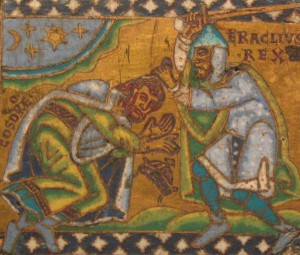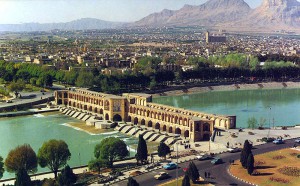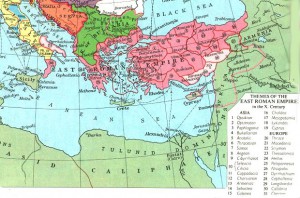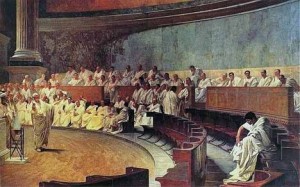 Pavel asks if Heraclius ever fought a battle at Issus- the famous spot where Alexander the Great defeated a huge Persian army led by his rival Darius.
Pavel asks if Heraclius ever fought a battle at Issus- the famous spot where Alexander the Great defeated a huge Persian army led by his rival Darius.
There must have been something about the place that attracted armies. By the time Heraclius showed up in 622 A.D. Issus had seen two previous major, empire defining, winner-take-all clashes. The first (and most famous) was in 333 BC when Alexander the Great met Darius and broke the back of Persian power. The second was in 194 AD during the year of the 5 emperors when the armies of Septimius Severus defeated his main rival. (A few days after the battle the victorious Severus mopped up the still defiant and relatively nearby Byzantium, where- anticipating Constantine by more than a century- he rebuilt it in his own honor)
Heraclius in a way combined his two predecessors- a Greek-speaking, Hellenized, Roman Emperor. In the autumn of 622, he crossed the Aegean looking for the Persian army. They met at the famous Issus, but unlike the previous two battles this one wasn’t decisive. Neither army was really willing to come to grips and (despite an alleged prediction by Mohammed that it would result in a major Roman victory), it was more of a skirmish. Heraclius spent the next several years trying to force a Persian engagement and nearly lost it all when he was ambushed crossing a river. The tide turned in 624, but it wasn’t until December of 627- half a decade after the battle of Issus- that he was able to fight a decisive battle with the Persians.
 Pavel asked how far east a Roman army ever campaigned.
Pavel asked how far east a Roman army ever campaigned.
Heraclius invaded central Persia in the spring campaigning season of 624. He reached as far east as Isfahan- then called Aspaban- farther east than any Roman army before (or after) would ever go. There was nothing preventing him from continuing on, but by then there was little need to. The Persians had seen their rash emperor nearly swallow Byzantium only to lose it all and more in the blink of an eye. When Shar-baraz, Persia’s best general, refused to engage Heraclius in battle, Chosroes II ordered him to be arrested and executed. Unfortunately for the paranoid Shah, Heraclius intercepted the letter bearing the command and- after adding a few names for good measure- passed it along to Shar-baraz. The ill-advised Persian housecleaning was the last straw. People and army rose up and Chosroes II was overthrown.
 Craig asks which emperor developed the Theme System.
Craig asks which emperor developed the Theme System.
This is one of the most disputed topics in Byzantine history. The word ‘theme’ was originally used to describe an army unit and only later became a political subdivision, so it’s very difficult to distinguish which of the two the sources are referring to. Just to make things more confusing, the word “Theme” at first referred to military rolls, and the first Themes took the name of the army corps stationed there. It’s nearly impossible to say exactly when the name of a division became the name of an area. The one thing that everyone agrees on is that it happened during the Heraclid Dynasty, but the exact emperor is unknown. Generally Heraclius is credited (as part of his reorganization of the empire), but his son and grandson (Constantine III and Constans II) are also possibilities. One theory even has it that the last member of the family- the disastrous Justinian II- came up with it.
The primary sources seem to favor Heraclius. Theophanes the Confessor (8/9th C) mentions Heraclius arriving ‘in the land of the themes’, but this might be an example of attributing present day conditions to the past- like a Renaissance painting of a mythological scene that has everyone dressed in 15th Century clothes. The 10th Century emperor Constantine Porphyrogenitus wrote a book On Themes where he says that the Themes were ‘since the time of Heraclius the Libyan (African)’. So who developed the Theme system? This time I think common knowledge has it right. Probably (I follow professor Angeliki Laiou here) the first Themes were instituted by Herakleios and the full development of the system took time to mature.
 It’s the morning after an election and as luck would have it Shane asks a political question- what did the Senate do other than enrich itself and plot?
It’s the morning after an election and as luck would have it Shane asks a political question- what did the Senate do other than enrich itself and plot?
Aristotle first observed that ‘man is a political animal’ and as far as senators go that animal hasn’t changed in more than 2,000 years.
From the beginning Byzantine senators were lured east by the perks- free grain and land at the state’s expense. There were relatively few duties to get in the way of enjoying the good life. While the Roman Empire held on to the conceit that it was a Republic long after any trace of representative government had vanished- as late as the 6th century it was still issuing coins proclaiming the Republic- actual responsibilities were few and far between. There was an obscure clause in one of Justinian’s law codes that said any new law had to be discussed by the Senate, but it was never enforced. Their sole administrative duty was to manage the spending of money on the exhibition of games or public works. This was not a highly lucrative job, so most senators (there were 2,000 of them) used the office for tax reasons- namely to escape the fees levied on others. (the more things change…)
Of course the Senate never quite forgot its august history and there were sporadic attempts to grasp real power. In 532 they participated in the Nika Riots hoping to replace Justinian with one of their own members. (Justinian repaid them by confiscating the Senate House and turning it into a reception hall for the Great Palace.) In 608 they elected Heraclius as Consul, then elevated him to emperor against the usurper Phocas. On his deathbed in 641, Heraclius thanked them by entrusting his young son Heraklonas to their care. The Senate promptly deposed the boy and replaced him with a grandson of Heraclius named Constans II. For the next three years the empire was openly ruled by the Senate- the first time since the assassination of Julius Caesar in 44 BC.
That turned out to be the swan song of senatorial ambition. After Constans came of age their importance quickly declined. The Macedonian emperors stripped them of most of their remaining duties and the Senate was turned into a glorified imperial court. Ordinary criminals were given a jury of 5 senators chosen by lot, while high treason involved the whole body. There was still a whiff of prestige attached to the name, but Alexius Comnenus did away with that by allowing anyone to purchase senatorial rank directly from the emperor.
Their last known act was to elect a man named Nicholaus Kanabus as emperor in opposition to the pathetic Isaac II during the fourth Crusade. Nicholaus- a gentle man- immediately fled to the Hagia Sophia and refused to come out. But his resistance to the imperial summons failed to save him. Another man seized control of the government, and as a warning to any challengers had Nicholaus dragged out of the church and strangled.
 Pavel asks if Heraclius ever fought a battle at Issus- the famous spot where Alexander the Great defeated a huge Persian army led by his rival Darius.
Pavel asks if Heraclius ever fought a battle at Issus- the famous spot where Alexander the Great defeated a huge Persian army led by his rival Darius.

